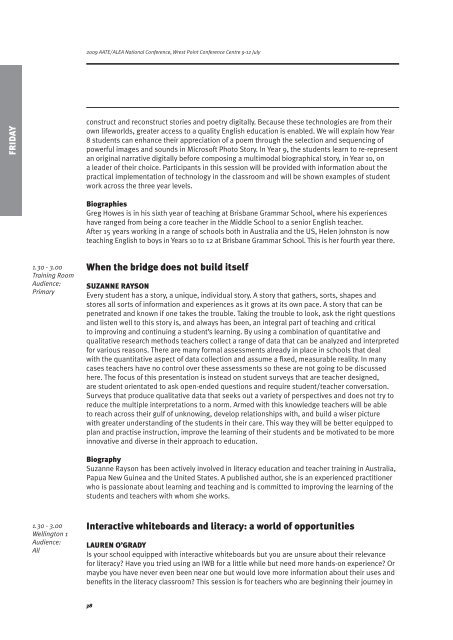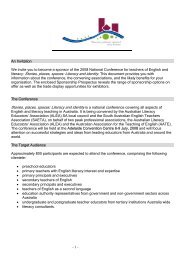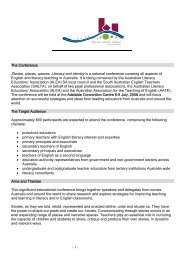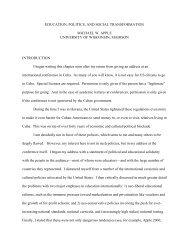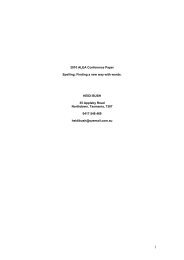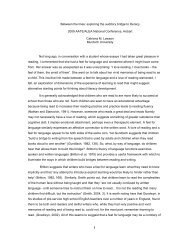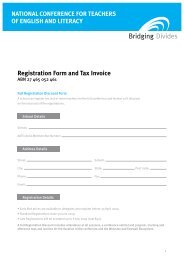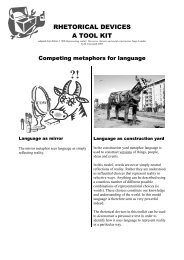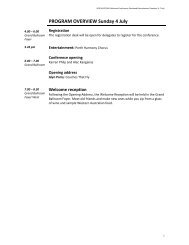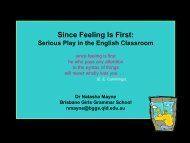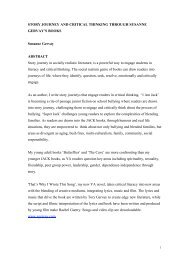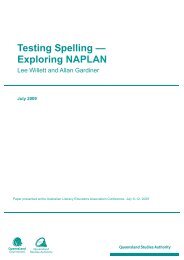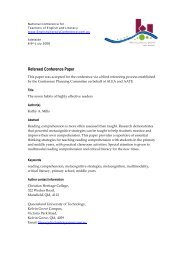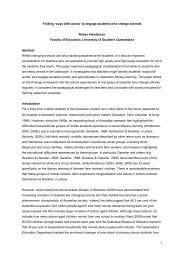Download - AATE/ALEA National conference
Download - AATE/ALEA National conference
Download - AATE/ALEA National conference
You also want an ePaper? Increase the reach of your titles
YUMPU automatically turns print PDFs into web optimized ePapers that Google loves.
2009 <strong>AATE</strong>/ <strong>ALEA</strong> <strong>National</strong> Conference, Wrest Point Conference Centre 9-12 July<br />
FRIDAY<br />
construct and reconstruct stories and poetry digitally. Because these technologies are from their<br />
own lifeworlds, greater access to a quality English education is enabled. We will explain how Year<br />
8 students can enhance their appreciation of a poem through the selection and sequencing of<br />
powerful images and sounds in Microsoft Photo Story. In Year 9, the students learn to re-represent<br />
an original narrative digitally before composing a multimodal biographical story, in Year 10, on<br />
a leader of their choice. Participants in this session will be provided with information about the<br />
practical implementation of technology in the classroom and will be shown examples of student<br />
work across the three year levels.<br />
Biographies<br />
Greg Howes is in his sixth year of teaching at Brisbane Grammar School, where his experiences<br />
have ranged from being a core teacher in the Middle School to a senior English teacher.<br />
After 15 years working in a range of schools both in Australia and the US, Helen Johnston is now<br />
teaching English to boys in Years 10 to 12 at Brisbane Grammar School. This is her fourth year there.<br />
1.30 - 3.00<br />
Training Room<br />
Audience:<br />
Primary<br />
When the bridge does not build itself<br />
SUZANNE RAYSON<br />
Every student has a story, a unique, individual story. A story that gathers, sorts, shapes and<br />
stores all sorts of information and experiences as it grows at its own pace. A story that can be<br />
penetrated and known if one takes the trouble. Taking the trouble to look, ask the right questions<br />
and listen well to this story is, and always has been, an integral part of teaching and critical<br />
to improving and continuing a student’s learning. By using a combination of quantitative and<br />
qualitative research methods teachers collect a range of data that can be analyzed and interpreted<br />
for various reasons. There are many formal assessments already in place in schools that deal<br />
with the quantitative aspect of data collection and assume a fixed, measurable reality. In many<br />
cases teachers have no control over these assessments so these are not going to be discussed<br />
here. The focus of this presentation is instead on student surveys that are teacher designed,<br />
are student orientated to ask open-ended questions and require student/teacher conversation.<br />
Surveys that produce qualitative data that seeks out a variety of perspectives and does not try to<br />
reduce the multiple interpretations to a norm. Armed with this knowledge teachers will be able<br />
to reach across their gulf of unknowing, develop relationships with, and build a wiser picture<br />
with greater understanding of the students in their care. This way they will be better equipped to<br />
plan and practise instruction, improve the learning of their students and be motivated to be more<br />
innovative and diverse in their approach to education.<br />
Biography<br />
Suzanne Rayson has been actively involved in literacy education and teacher training in Australia,<br />
Papua New Guinea and the United States. A published author, she is an experienced practitioner<br />
who is passionate about learning and teaching and is committed to improving the learning of the<br />
students and teachers with whom she works.<br />
1.30 - 3.00<br />
Wellington 1<br />
Audience:<br />
All<br />
Interactive whiteboards and literacy: a world of opportunities<br />
LAUREN O’GRADY<br />
Is your school equipped with interactive whiteboards but you are unsure about their relevance<br />
for literacy Have you tried using an IWB for a little while but need more hands-on experience Or<br />
maybe you have never even been near one but would love more information about their uses and<br />
benefits in the literacy classroom This session is for teachers who are beginning their journey in<br />
38


